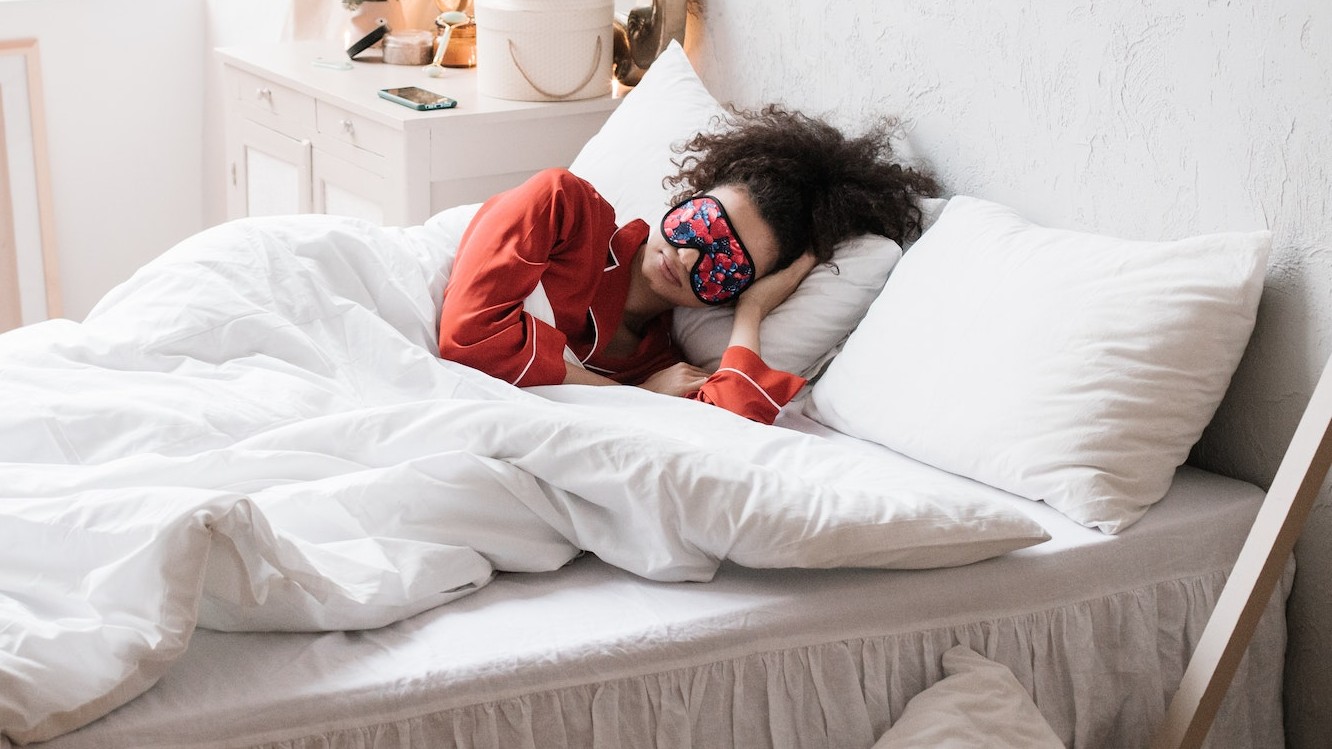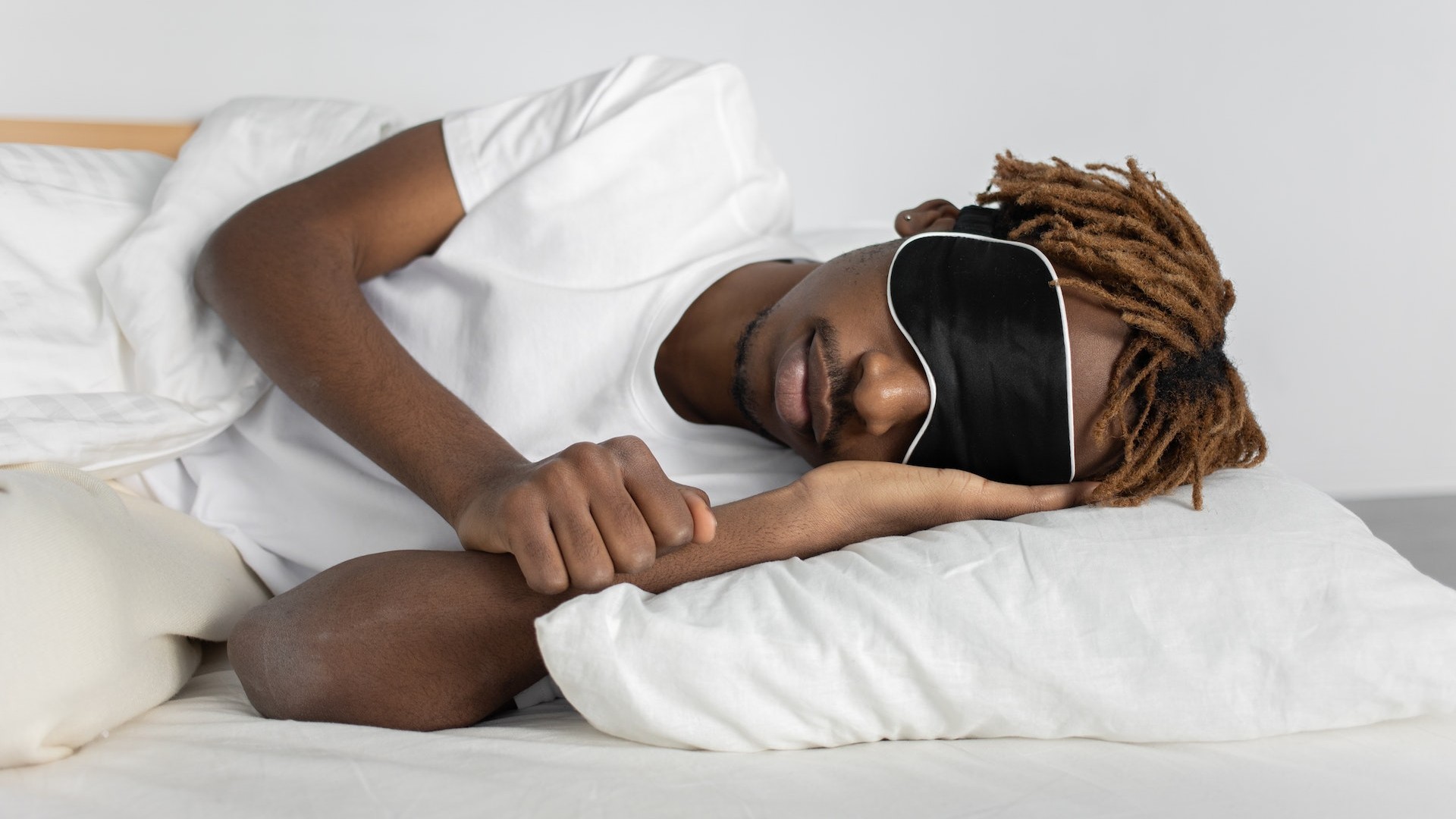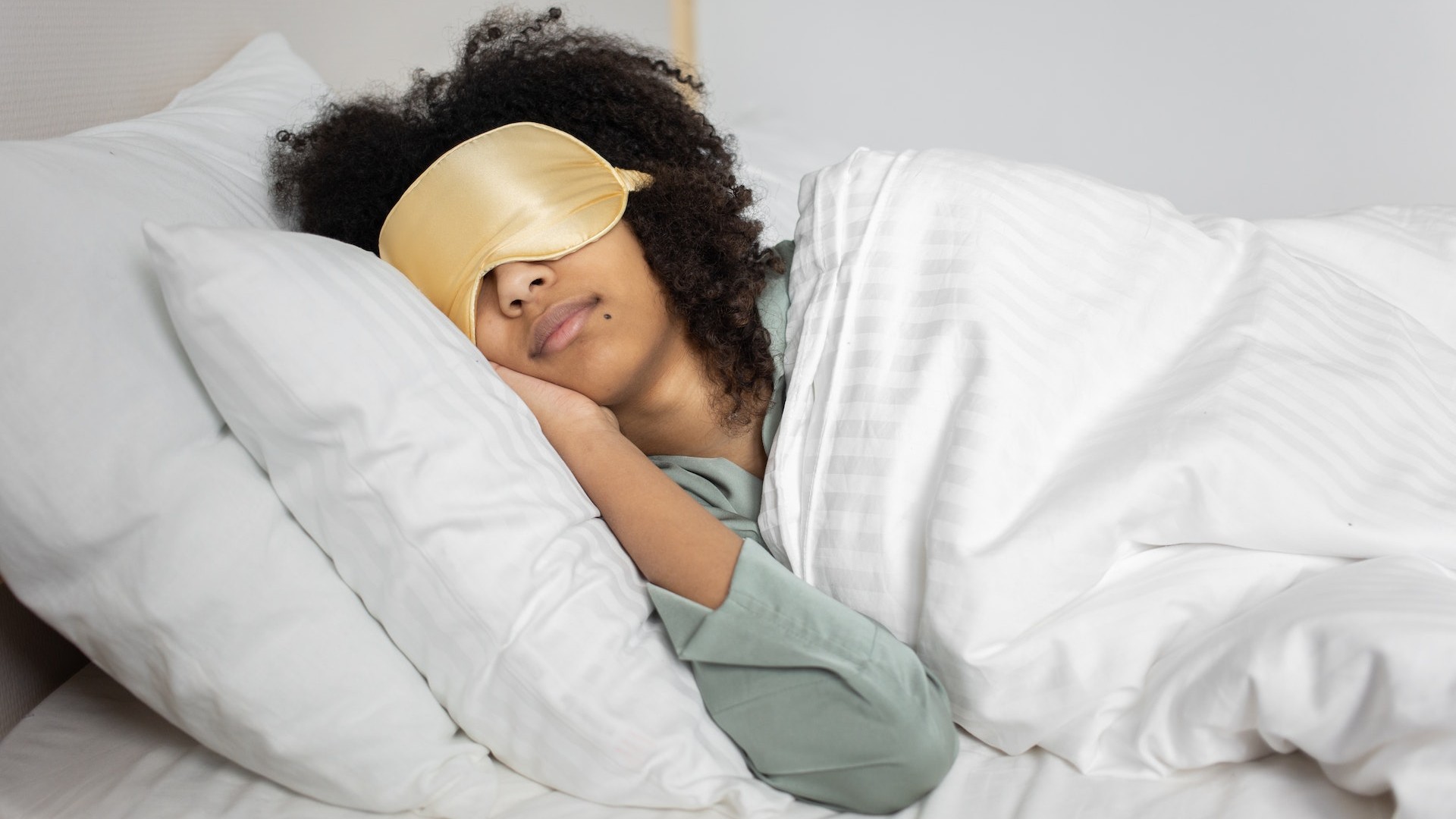
Getting a good night's sleep is crucial for our physical and mental well-being. But many of us struggle to sleep properly, even if we've invested in the best mattress and best pillow for extra comfort. And that's because of the ambient light and other visual distractions in our bedroom, overstimulating us and keeping our bodies awake. This is where sleep masks come in.
A sleep mask, also known as an eye mask, is a simple but effective tool that can help us improve the quality of our sleep by reducing the amount of light coming into our eyes. In this article, we will explore the benefits of sleep masks, how they work and what the benefits are, as well as potential drawbacks.
Not sure whether you're sleeping properly? Then also check out our guide to the best sleep trackers.
What is a sleep mask?
A sleep mask is a mask that covers the eyes and blocks out light to help you sleep. They're typically worn in rooms with a lot of light pollution at night, or by people travelling on coaches, trains or planes. They are also used by people with medical conditions that are exacerbated by light, such as migraines or seasonal affective disorder.
What are the benefits of using a sleep mask?
"Sleep masks that block out ambient light help to minimise the impact of light interrupting our sleep," says Dr Zoe Gotts, consultant clinical psychologist at the London Sleep Centre. "The constant darkness allows us to sleep in accordance with our natural rhythm for a more consistent and restful sleep."
We all know instinctively that shutting out light helps get into deep sleep, because it reduces the amount of visual distractions that can keep us awake. (To cut out aural distractions too, see our guides to the best sleep earplugs and the best white noise machine.) Darkness also stimulates our bodies' production of melatonin, a hormone that encourages sleep.
"This is especially important for people who are sensitive to light or who live in areas with high levels of ambient light, such as cities or next to busy roads or sidewalks," says Hafiz Shariff, a sleep expert and the founder of Owl + Lark. "By blocking out this distraction, sleep masks can help you fall asleep faster, stay asleep longer, and wake up feeling more refreshed; without being disturbed by every passing car headlight or overly bright street lamp.
"Sleep masks help to mimic the darkness that we see at nighttime in nature," he continues. "This sends signals to our brain that it’s time to sleep, making it a helpful tool for people who might need to sleep during the day or have irregular hours, such as shift workers or frequent travellers. Our brains use sunlight as a cue for when to wake up, so by creating artificial darkness, sleep masks can help keep your circadian rhythm regular and prevent your body from staying awake at the first sign of natural light."
And that's not all. "Sleep masks can also help with allergies and dry eyes," adds Dr Gotts. "Particularly if you're heating or cooling a room, which can encourage circulation of dust particles or pet hair whilst sleeping. The mask will act as a barrier for your eyes to protect them through the night."

What are the disadvantages of sleep masks?
Sleep masks aren't for everyone. "Depending on the material and fit, some masks may feel uncomfortable or irritate the face or skin," says Dr Gotts. "If worn too tightly, the mask may cause pain and discomfort which in turn may disturb sleep."
Shariff adds that "skin irritation can occur if the mask is made from materials that are irritating to the skin, such as abrasive synthetic material like polyester which doesn’t let the skin breathe as well as natural options like silk or cotton. To avoid this, choose a mask that is made from hypoallergenic materials."
And here's one more potential pitfall. As Dr Gotts notes, "If you rely on natural light to wake you up naturally then wearing a sleep mask may cause you to sleep longer than intended; in which case, set an alarm."
What are the alternatives to sleep masks?
If the above issues mean you don't get on with sleep masks, there's an obvious solution. "If the bedroom is dark and you can be certain of no ambient light distractions, a mask may not be necessary," points out Dr Gotts.
Sharrif explains how you might go about this. "You can create a dark bedroom environment by using blackout curtains or shades to block out outside light, and painting your walls a cooler and darker hue that won’t reflect as much light, such as grey or blue," he explains.
What are the different types of sleep mask?
There are a number of different types of sleep mask. "One of the most common types is contoured sleep masks, which are designed to fit the contours of your face to prevent light from seeping in around the edges," says Evelina Sabonaityte, medical doctor at Glow Bar London. "They offer excellent light blocking, and are good for side sleepers."
"Countoured sleep masks can be particularly helpful for people who find classic eye masks uncomfortable or need a more secure fit to block out light," adds Shariff. "However, unless you buy a custom-fitted one they aren’t always a perfect fit."
Natural fiber sleep masks are made from materials like silk or cotton, are more breathable and less likely to cause skin irritation. "They are an excellent option for those with sensitive skin, allergies, or those who live in hot and humid climates," says Dr Sabonaityte. "These masks are soft, lightweight, and comfortable to wear, and they allow for better airflow, which can help regulate body temperature."
Another type of sleep mask is the gel sleep mask, which contains gel or beads that can be cooled in the fridge, providing a soothing effect to puffy or tired eyes. "These masks are ideal for people who experience eye strain or headaches due to eye fatigue," says Dr Sabonaityte. "They can also help reduce inflammation and promote relaxation, making them an excellent option for those who want a more therapeutic experience."
"These can be particularly helpful for people who struggle with temperature regulation at night, or who live in climates with extreme temperatures, and are good for those with sensitive skin who may react to heat or their own sweat,” adds Shariff.
Then there are weighted sleep masks. "These contain small beads or pellets that provide gentle pressure around the eyes and forehead, which can help promote relaxation and reduce stress," explains Martin Seeley, sleep expert and CEO of MattressNextDay. "They are often made from soft, breathable materials like cotton or fleece."
"Alternatively, disposable sleep masks are made from lightweight materials like paper or foam and are intended for single use," Seeley continues. "They are convenient for travel or for occasional use, but may not be as comfortable or effective as reusable masks.
"Finally, you can also buy heated sleep masks, which contain small heating elements that can be warmed in the microwave, or with a USB connection. They are designed to provide soothing warmth and relieve tension around the eyes and forehead."

Can wearing a sleep mask be bad for you?
Some people may experience skin irritation or allergic reactions from wearing a sleep mask, especially if it's made from synthetic materials, says Dr Sabonaityte. "It's essential to choose a sleep mask made from natural and hypoallergenic materials to avoid skin irritation. Moreover, sleep masks need to be cleaned regularly to prevent the build-up of bacteria, which can cause eye infections. Also, some individuals may find sleep masks uncomfortable or restrictive, particularly if they suffer from claustrophobia or anxiety."
Martin Seeley adds a further worry. "Some people may become dependent on wearing a sleep mask in order to fall asleep," he explains. "This can make it difficult to sleep without the mask, especially if you are traveling or in a situation where you do not have access to your mask."
How often should you wash a sleep mask?
"If the sleep mask is not cleaned regularly or is shared with others, it can harbor bacteria, viruses, or fungi that can cause infections or irritations of the eyes or skin," says Seeley. "So it's essential to keep your sleep mask clean to maintain good hygiene and prolong its lifespan."
As a rule of thumb, you should wash your sleep mask every three to seven days. However, if you sweat a lot, or use your sleep mask every night, you may need to wash it more often.
What alternatives are there to sleep masks?
"Alternatives to sleep masks include blackout curtains or shades, which can help block out ambient light from windows, or using a dimmer switch or red-light bulb in the bedroom to create a calming environment," says Dr Sabonaityte. "However, these alternatives may not be as effective as a sleep mask in completely blocking out light."
Seeley adds: "Other alternatives could be using a scarf or item of clothing and draping this over your eyes and face. Some people find sleep masks uncomfortable or tight, and prefer to have something covering the eyes that is less fixed. Along with black out blinds or curtains, I'd also consider removing any items that cause sleep disturbance from light such as an alarm clock, charging outlet, night lamp or any other device using light."
Get daily insight, inspiration and deals in your inbox
Sign up for breaking news, reviews, opinion, top tech deals, and more.
Tom May is a freelance writer and editor specialising in tech, design and sleep products. Over the years he's tested a number of mattresses, duvets and pillows, and as a back pain sufferer, has a keen interest in finding ones that offer maximum support. Plus, in running a successful Airbnb business, sleep hygiene and providing the right bedding for guests has become a big part of his day-to-day life. He is author of Great TED Talks: Creativity, published by Pavilion Books.
